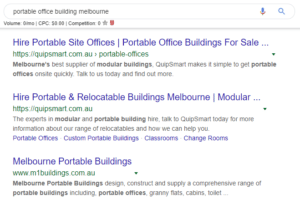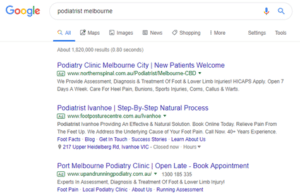Chances are you want to achieve rapid, profitable growth for your business. And you probably already know that to achieve that growth, you’ll need a well-considered, digital marketing strategy. But if you’re like many business owners, you might not be sure where to start.
Google Ads? SEO? Social Media?
It can be overwhelming.
To fast-track your growth, you’ll need to select the most relevant and effective digital marketing strategies for your business. Here’s an insight into 3 powerful digital channels and how you can know if they’re right for you and your business.
Search Engine Optimisation – Long term, natural traffic growth
Search Engine Optimisation (SEO) is the process of driving online traffic from the “free”, “organic” or “natural” search results on popular search engines like Google. Google is a bit like a digital filing cabinet – when you type in certain keywords, the Google algorithm scans, sorts, and filters to show searchers the ‘most relevant’ sites to satisfy their search needs.
SEO is all about getting to the top of natural Google rankings for relevant keywords so customers see your website first, before they find your competition. In the screenshot below you will see that one business has hit the top two organic ranking spots on Google.

While almost no one truly knows the complete secret of Google’s complex search algorithm, years of experience have demonstrated that the following practices can boost your organic rankings:
While it often takes a few months or even longer to achieve page 1 rankings, depending on the industry, you don’t need to pay Google each time someone clicks on your site, making SEO a powerful long term strategy for growth. So you’re not in a rush to achieve results – and you’re prepared to play the long game – SEO can be a powerful digital marketing strategy for many businesses.
Google Ads – The fastest way to the top
Google Ads management (Aka PPC) is Google’s paid advertising system that enables you to appear at the very top of search results (even above SEO organic results!) when people are searching for your products or services.
It’s very easy to start it yourself (though not as easy as it used to be), but many businesses turn to specialist Google Ads agencies.
You can set a daily campaign budget and specifically target certain keywords relevant to your business offering while only paying when prospects click on your ads and are sent to your website.
Google Ads is the single fastest way to get your site to the very top of Google search results and boost traffic that’s targeted, relevant and ready-to-buy. After all, they already have the intention of buying your product or service.
In the screenshot below, you’ll notice a little “Ad” box on the left of the top 4 listings – that’ll show you that it’s a paid Google Ad.

When people click on those ads, you’ll pay anywhere from 10 cents to 10 or 20 dollars for high-demand keywords. Of course, if people don’t click, you don’t pay. The advantage is that you can determine within a very short time if you’re achieving a return on your marketing investment.
Google Ads also provides you with incredible control and transparency. You can determine when and where your ads appear, who gets to see them, your specific messaging, and more. You also get to see the results in real-time, enabling you to analyse which ads produce clicks and conversions, their click-through rates and how much they’re costing you. Under the Google ads umbrella you also have Google Shopping ads which is sensational for e-commerce, display and remarketing, Youtube and a lot more which are better suited for top of funnel strategies and usually with larger budgets.
In summary, Google Ads is a great way to get leads and results fast – just make sure you’re tracking results and costs to ensure you’re achieving a ROI.
Social Media – Reach and engage, deeply, with your audience
A social media campaign is a coordinated marketing effort to reinforce or assist with a business goal using one or more social media platforms including but not limited to Facebook, Instagram & Twitter. Campaigns differ from everyday social media efforts because of their increased focus, targeting, and measurability.

Common goals for social media campaigns include:
There are multiple ways to execute a social media campaign. It’s common to think of a campaign as a series of regular postings of blogs, memes, ads and other content to your business (or personal) social media account and hoping your contacts will see, like and share those posts with their networks. While this approach can still work in some channels, social channels are making it even harder to gain traction via unpaid posts, especially for businesses.
And that’s where ‘paid’ social media campaigns come in. Social channels like Facebook and Linked In, for example, allow you pay to target individuals beyond your network based on specific demographic criteria or personal interests, enabling you to attract some of the most highly targeted leads any marketing channel can offer.
To determine which social media channel to use, you’ll need to know where your target customers ‘hang out’. While you’ll need to tailor your strategy based on your specific customers, here are some general guidelines to help you:
What next?
So there you have it: 3 key digital channels. Your task now is to decide which channels are right for your business. Here’s a quick summary to help you:
Good luck and let us know if you’d like free strategy session to help you work out which channel is right for your business. Or if you want a deeper insight into the full range of digital marketing strategies available to you, download our free Ultimate Digital Marketing Roadmap today.